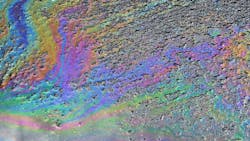PARIS -- Scientists said Tuesday they had manufactured a lightweight and reusable material that can absorb up to 33 times its weight in certain chemicals -- a possible new tool against water pollution.
The team made nanosheets of boron nitride, also called white graphene, that were able to soak up a wide range of spilled oils, chemical solvents and dyes such as those discharged by the textile, paper and tannery industries.
Highly porous, the sheets have a high surface area, can float on water and are water-repellent, the team from France and Australia wrote in the journal Nature Communications.
Once the white sheets are dropped on an oil-polluted water surface "they immediately absorb the brown oil and become dark brown," they wrote.
"This process is very fast; after just 2 minutes, all oil has been taken up by the nanosheets."
Once saturated, the sheets can be easily picked up from the water surface and cleaned by burning, heating or washing to be reused several times.
Materials such as activated carbon or natural fibers commonly used to counter spills generally have a much lower absorption than their newly-created material, the authors wrote.
Other materials with high absorption have been manufactured -- but proved difficult to recycle.
"The new material and related technology will have (an) important impact on environmental protection," study co-author Ian Chen of Australia's Deakin University told AFP by email.
And he added: "they are not expensive."
Nanostructured materials like white graphene are composed of structural elements, clusters of atoms, of between one and 100 nanometers (a billionth of a meter) big.
Copyright Agence France-Presse, 2013
About the Author
Agence France-Presse
Copyright Agence France-Presse, 2002-2025. AFP text, photos, graphics and logos shall not be reproduced, published, broadcast, rewritten for broadcast or publication or redistributed directly or indirectly in any medium. AFP shall not be held liable for any delays, inaccuracies, errors or omissions in any AFP content, or for any actions taken in consequence.
